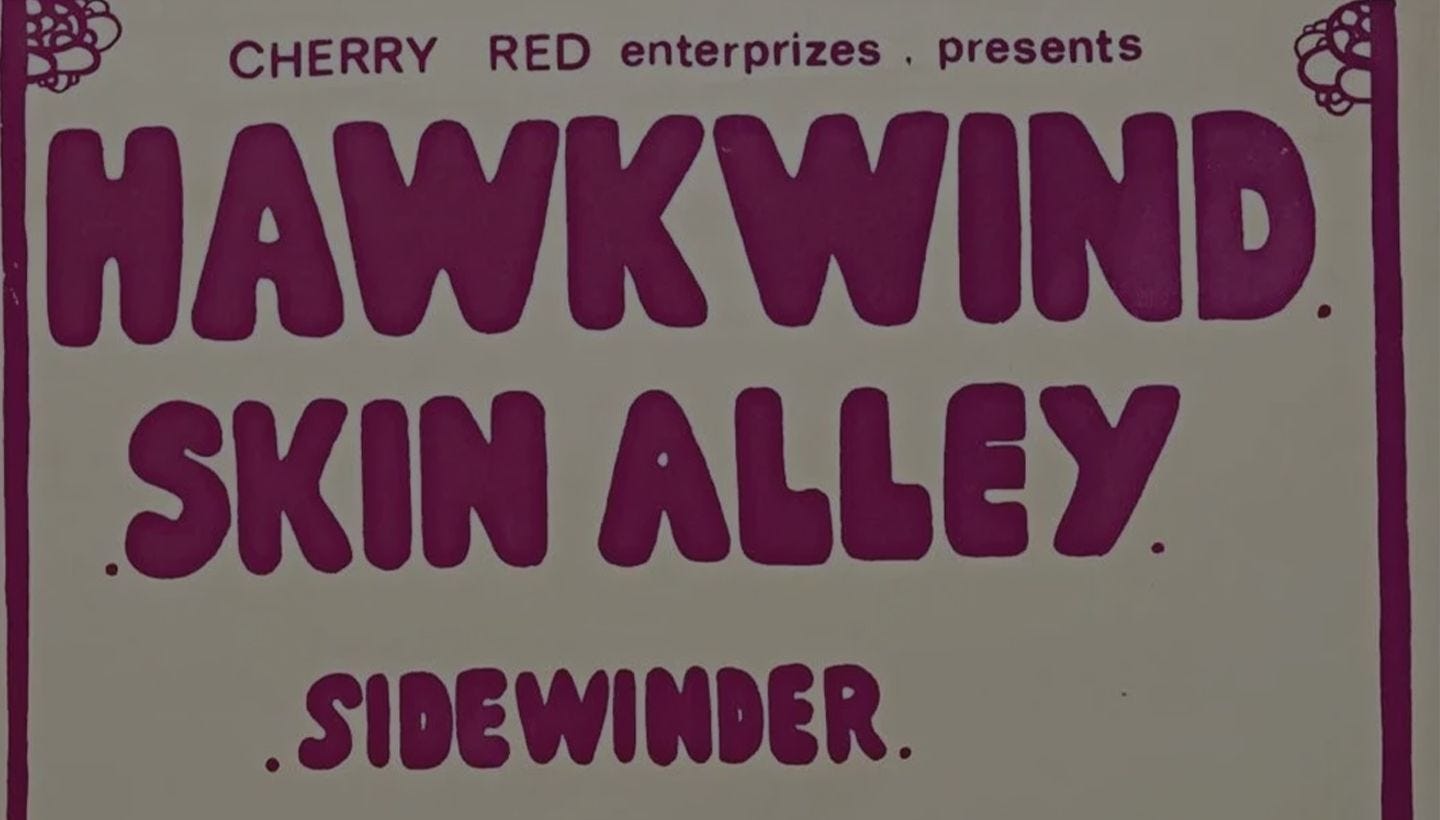Promotion Candidates: The 50th Anniversary Of Cherry Red Promotions
Cherry Red Records began operations in 1978 as a fledgling independent label under the guidance of Iain McNay. However Cherry Red itself began seven years earlier as a promotions company, and tomorrow marks the 50th anniversary of the first show – Hawkwind and Skin Alley performing in Malvern on the evening of 3rd July 1971.
Cherry Red Promotions was the earliest iteration of the company, and this is the story of their journey from promoting gigs to releasing records. From Black Sabbath to Judas Priest, The Damned to The Jam, Van Der Graaf Generator to The Fall, read Michael Heatley’s fascinating take on those times (with a full gig listing) and how the circle completes by 2021.
“Lemme get at ’im!”
That angry shout might have been ringing in Iain McNay’s ears when he had the audacity to unplug Motörhead in mid performance at the Winter Gardens, Malvern, two weeks before Christmas 1979.
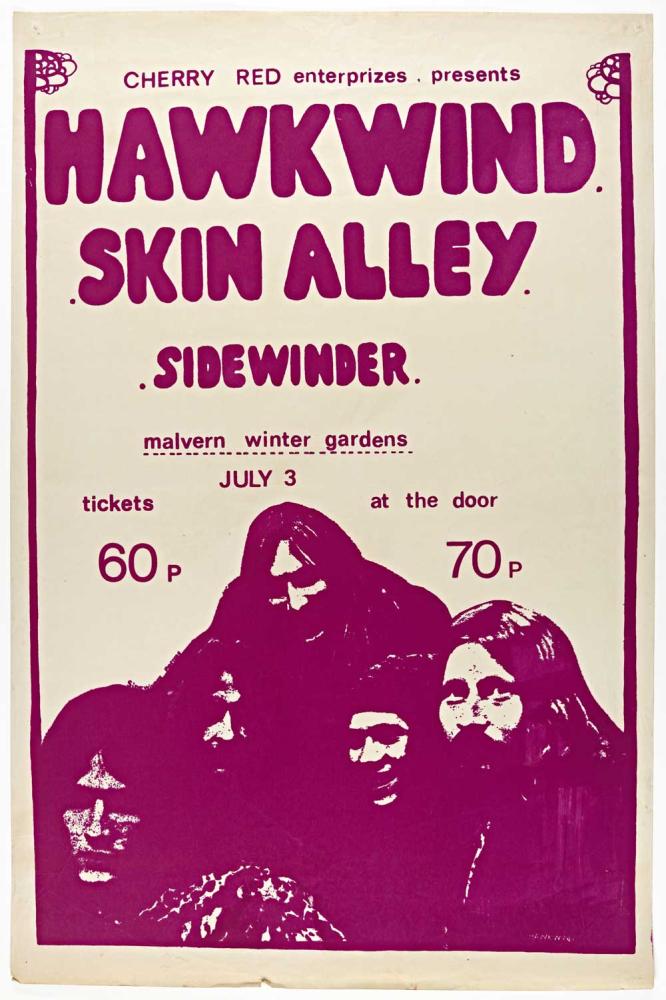
The now CR chairman had taken his life in his hands to ensure the decade of gigs Cherry Red Promotions had staged in the Worcestershire town continued. They’d kicked off in July 1971 with Hawkwind, coincidentally the group Motörhead’s Lemmy would use as a springboard to fame.
Iain has survived to tell the tale – as has Richard Jones, another of the three-man team that wrote the Seventies social calendar for the youth of Great Malvern. Will Atkinson, who named the venture by borrowing the title of a Groundhogs song, passed away in 2010. But, decades ago, it was the combination of the trio’s talents that gave Cherry Red Promotions lift off.
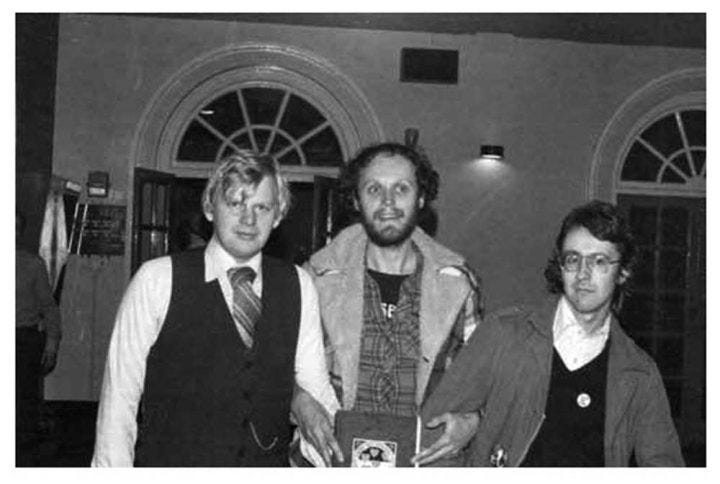
“It worked extremely well,” Richard recalls. “I designed the tickets and posters, the distribution, collected all the money. Will looked after the equipment and people on the night and Iain took care of the finances and contractual side.”
London-based McNay was an accountant working for an American film company and shared a house in Surrey, with art student Jones – who, most weekends, returned to the family home in Malvern.
Third man Atkinson had started the Sidewinder disco before linking with Jones’s Krishna light show and promoting gigs at Lansdowne Youth Club. Bands included Blossom Toes, Free, Spooky Tooth and a local outfit featuring soon-to-be Led Zeppelin stalwarts Robert Plant and John Bonham. (The Band of Joy, as they were known, played their final gig in a local quarry, an outdoor show that’s gone down in legend.)
As the youth club only held about 80, activities moved to the Winter Gardens, an impressive building with a glass frontage and terrace as found in many a spa town. The management had airs and graces to match, and it was a question of keeping them sweet, strictly observing the curfew and making sure indiscretions from bands or audiences were hidden from view. A naked man ‘idiot dancing’ at a Lindisfarne show was par for the course…
Black Sabbath – who filled the Winter Gardens to its 1,200 capacity thanks to hit single ‘Paranoid’ – and Chicken Shack were among the attractions that made money for the youth club. But it was increasingly concerned about the level of financial risk, while Sabbath’s name caused mutterings of “immoral earnings”. The booking of Black Widow, another ‘Satanic’ band, was the last straw.
Enter Iain McNay. “We didn’t know anybody with money,” said Will. “Iain at least knew about money, and I’m pretty sure he was earning more than us!”
Cherry Red Promotions opened for business on 3rd July 1971 with a gig by Hawkwind and Skin Alley, plus the Sidewinder disco. “We had absolutely no idea what was going to happen,” McNay, then 24, now admits. “We didn’t know whether we’d attract 100 or 1,000. But 600-plus turned up and we turned a small profit.”
Tickets priced at 60p were, Winter Gardens stalwart Stuart Davis points out, good value. “We were getting bands in a small town… They’d have had to go to Birmingham or Bristol, thirty-odd miles away, and in those days many people didn’t have cars.”
Bands received a guarantee of £3-500 against 60% of door takings – today’s norm is 80. The locally sourced support band could expect a nominal fee, while hall hire cost around £100.
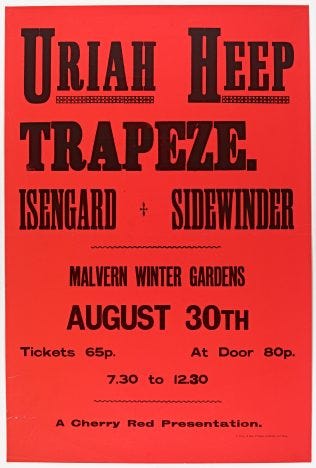
Next up was Uriah Heep, about to release breakthrough chart album ‘Demons And Wizards’. They sold more advance tickets than Hawkwind – but, when support act Trapeze, fronted by future Deep Purple member Glenn Hughes, won a standing ovation and an encore, Heep required half an hour’s sweet-talking to play.
Wolverhampton band Trapeze had played the gig for £60 as opposed to Heep’s £200 and were rewarded by a better-paid headlining gig. Other outfits from the general area to grace the Gardens stage included the early Electric Light Orchestra, Wizzard and Steve Gibbons.
A 50 per cent break-even meant the right bands had to be chosen. Profits went back into the business, but the Winter Gardens were less than forthcoming when it came to improving facilities: when three-phase power became an industry standard, Cherry Red had to pay.
By January 1973, when the Strawbs played Malvern, gigs were occurring twice a month. They were heading for Number 2 with ‘Part Of The Union’ and were guaranteed a £1,000 fee. Iain McNay personally stumped up £600, so the extra few hundred bodies crammed in that night can be excused.
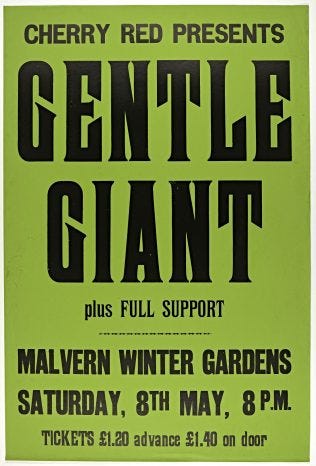
Tickets were available from the venue and record shops, but as time went by an unofficial sales network emerged. A batch of 50 tickets would be allocated to a couple of girls’ schools and, when sold, the vendors would get in free. “We had a fair number of teenage girls who would turn up with ticket money and maybe have one or two drinks too many,” Richard admits, adding: “We exercised a certain amount of responsibility and oversaw them getting back home. When I look back, I wonder if you could actually do that now…”
The tickets and posters he designed have become sought-after rock memorabilia in the same way as Friars, Aylesbury. A newsletter was started in the middle of the decade, while a record stall, Bubbles – run from the Cherry Red flat in Wells Road and present at the concerts – would make invaluable contacts in the distribution world.
The advent of new wave and punk in 1976-77 meant audience and artists were becoming more of an entity. And this suited Richard Jones. “It had started off interesting with Hawkwind and the Pink Fairies, but I wasn’t as interested in the rest. When ‘76-77 came along a lot of new, exciting bands blew me away. It was a new lease of life.” Up-and-coming Aussies AC/DC played in February 1977, and ‘schoolboy’ Angus Young on the shoulders of bare-chested Bon Scott caused such a stir they came back in October. Black Sabbath were in the audience this time to check out the competition!
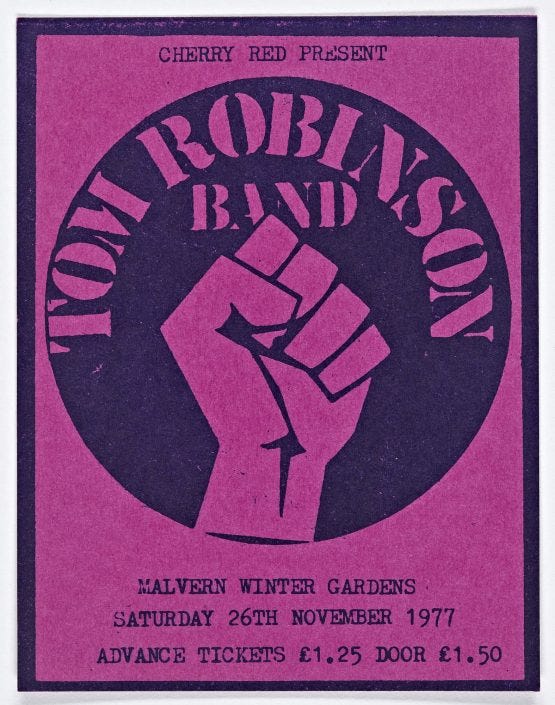
Ticket for The Tom Robinson Band at Malvern Winter Gardens, 26 November 1977
But along with the energy and excitement came an aggressive undercurrent: Strangler JJ Burnel had an altercation with an audience member, wielding his bass in mid-song, while Generation X’s Billy Idol reportedly punched a stage invader. Security chief Bill Pritchard recalls Dave Vanian of the Damned putting his hand through a window in anger backstage, “and we had to bandage him up. My brother was ill and after the gig I had to take him to casualty, where the Damned singer was sitting…”
Siouxsie and the Banshees, with Robert Smith from the Cure filling in on guitar, were a musical highlight of 1979, but Richard had to condemn some post-gig ructions in his next newsletter. “Some of you people are so stupid! All of us here tonight should be united in one cause, not fighting each other” he said of an incident that was reported in the local press.
Certain gigs booked during this period became legendary, even though they didn’t happen. Blondie and the Ramones were two, while the SPOTS (Sex Pistols On Tour Secretly) caused a difference of opinion. Iain McNay insisted the Winter Gardens would have to be told, and when manager Glen Kilday said “There’s no way I can allow that, I’ll lose my job,” the undercover gig was off.
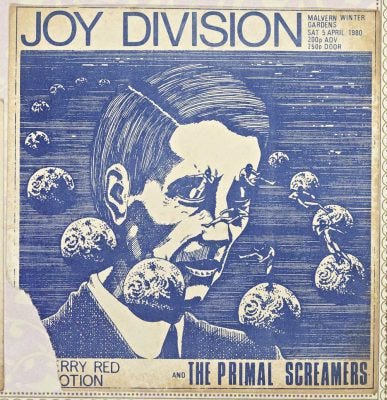
Ticket for Joy Division at Malvern Winter Gardens, 5 April 1980
Richard Jones recalls the Clash being booked, only to find the date ‘clashed’ with a local teenager’s birthday party. “We should have paid her to have it somewhere else,” he groans. A pre-fame Tom Petty was another big miss, this time on budgetary grounds. They had better luck in 1980 with the Jam, who recorded one of their two performances for a video, and Joy Division, who appeared a month before Ian Curtis’ death.
Though Cherry Red Promotions continued sporadically through to 1981, the Motörhead gig of the previous December had signaled the beginning of the end for fortnightly shows. A fog-delayed flight from London had found the band arriving at the Winter Gardens at ten, the curfew already looming.
“They couldn’t get Lemmy off stage,” Will recalled years later, “so some kind person went to the back of the hall and threw the power switch. Motörhead, being a lovely bunch, decided to look for the man responsible. By then we had a room full of policemen, including a chief superintendent and a police dog. Luckily I was standing by them when the roadies and Lemmy found me!” Iain, meanwhile, had wisely “made myself unavailable.”
Richard Jones “still can’t believe Iain got out of it unscathed…they were not happy,” while Bill Pritchard recalls “the guy on the mixing desk being so angry he picked up a chair, threw it against the wall and took out all the side lights. I remember grabbing hold of him…”
In Richard’s view, Cherry Red Promotions had come to a natural conclusion. “By Motörhead, we’d realised that it was no longer a novelty. The music scene had moved on and were no longer able to pick up bands on the up at a price we could afford. The bands we had in the last 12 months were playing bigger venues – not stadiums, because they weren’t around then, but to 2-3,000 people, which we couldn’t do.”
Ticket prices had risen as bands’ demands grew: Motörhead was £3.50, another reason the curtailed show left a bad taste all round. But Cherry Red had already seen the future: a single with local band the Tights was their first venture into recorded music.
Guitarist Rob Banks and pals had been Winter Gardens regulars since the age of 14, begging, borrowing or stealing to gain entry. “Cherry Red Promotions managed to get a lot of our favourites to play there – Hawkwind, Thin Lizzy, and Curved Air, to name a few. Once a month there would be a great band to see. It was a big venue for that neck of the woods.
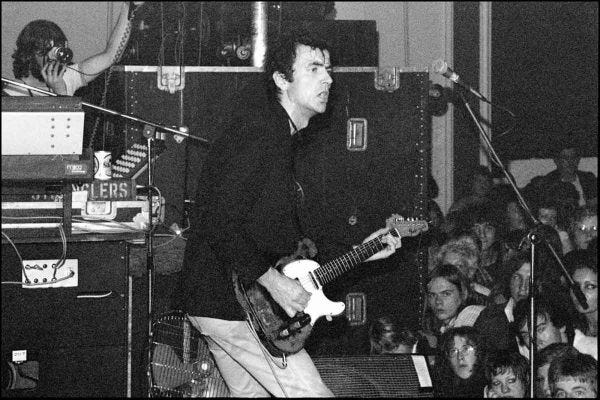
“When punk came along they stuck out their necks and put on the Stranglers, Eddie and the Hot Rods, the Damned… We supported Wire and Dr Feelgood. All the bands around that time had learnt to be suspicious of record companies, the media, the establishment, pretty much everyone. It’s only in retrospect that we realised what Cherry Red had actually risked by starting their record company and putting faith in the Tights.”
The Tights didn’t make it but Cherry Red Records went from strength to strength, the Dead Kennedys their breakthrough signing. Richard made the move to London, then took off to concentrate on his own No Future label with his pal Chris Berry.
It would have been nice to mark the 50th anniversary this July with a Hawkwind gig, had the pandemic permitted. But the achievements of Cherry Red Promotions were recalled a couple of years ago by Rock Around the Hills, a charitable organisation which created an exhibition at Malvern and Worcester Libraries telling the story of live music in the town from 1961 to 1990. Captain Sensible from the Damned was one of those it attracted. If you missed it, catch up at malvernrockarchive.org.uk
Another fitting postscript is the fact that many of the bands promoted in the Seventies have since had music released by Cherry Red. Hawkwind, the Strawbs, Curved Air and Barclay James Harvest have recorded new material, while Trapeze, Bebop Deluxe, Man and more have been reissued. “That’s a good point to bring out,” smiles Iain McNay today. “The fact the music has survived is also extraordinary…younger people are discovering these bands too, which is fantastic.”
As we celebrate events half a century ago, one thing is certain. However many awards and plaudits the Cherry Red label amasses in the future, the story that has flourished on the banks of the Thames started in sleepy Malvern.
– Michael Heatley
CHERRY RED CONCERTS- Malvern Winter Gardens and Festival Theatre
Date
Headline band
Support band
Support band
Remarks
Saturday, 3 July 1971
Hawkwind
Skin Alley
Sunday, 1 August 1971
Uriah Heep
Trapeze
Isengard
Saturday, 18 September 1971
Edgar Broughton Band
Fusion Orchestra
Saturday, 30 October 1971
Pink Fairies
Supertramp
Saturday, 22 January 1972
Trapeze
Isengard
Friday, 24 March 1972
Barclay James Harvest
Friday, 30 June 1972
Van Der Graaf Generator
Scraggs
Saturday, 22 July 1972
Soft Machine
Unicorn
Friday, 22 September 1972
ELO
Bandy Leggs
Saturday, 14 October 1972
Wizzard
Fusion Orchestra
Wednesday, 1 November 1972
Fairport Convention
Pewke Band
Saturday, 18 November 1972
Velvet Underground
9.30 Fly
Saturday, 9 December 1972
Stray
Canyon
Saturday, 23 December 1972
Status Quo
Snake Eye
Saturday, 27 January 1973
The Strawbs
Pewke Band
Saturday, 17 February 1973
Groudhogs
Bandy Leggs
Saturday, 17 March 1973
ELO
Steve Gibbons Band
Monday, 27 August 1973
Stackridge
Walrus Gumboot
Saturday, 7 April 1973
Curved Air
Gary Moore Band
Saturday, 28 April 1973
Sunderland Bros and Quiver
Albert
Tuesday, 15 May 1973
Barclay James Harvest
Pewke Band
Saturday, 2 June 1973
Fusion Orchestra
Lazy
Monday, 11 June 1973
Fanny (Wolverhampton)
Moonstone
Saturday, 30 June 1973
Medicine Head
Mankind
Saturday, 21 July 1973
Lindisfarne
Quicksand
Saturday, 22 September 1973
Geordie
Mammoth
Tuesday, 6 November 1973
Nazareth
Saturday, 24 November 1973
Procol Harum
Big Two (originally Procol Harum)
(Cancelled)
Saturday, 24 November 1973
Big Front Yard
Pewke Band
Saturday, 22 December 1973
Home
Malvern Dolls
Saturday, 26 January 1974
Argent
Walrus Gumboot
Saturday, 16 February 1974
Barclay James Harvest
A J Webber
Thursday, 4 April 1974
Stackridge
Dragonsmilk
Friday, 19 April 1974
Gryphon
Peter Hammil
Friday, 3 May 1974
The Incredible String Band
Saturday, 1 June 1974
Phillip Goodhand Tait
Sheewater
Malvern Festival Theatre
Saturday, 15 June 1974
ELO
Raymond Froggatt Orchestra
Friday, 5 July 1974
Cockney Rebel
Malvern Festival Theatre
Saturday, 20 July 1974
Refugee
Monday, 26 August 1974
Greenslade
Kit Crew
Saturday, 7 September 1974
Fusion Orchestra
Saturday, 5 October 1974
JSD Band
Curly
Thursday, 24 October 1974
Lindisfarne
Wally
Friday, 20 December 1974
Leo Sayer
Sundance
Debbie and The Dreamboats
Saturday, 18 January 1975
Thin Lizzy
Thursday, 6 February 1975
Hawkwind
Thursday, 27 March 1975
Curved Air
Trace
Thursday, 10 April 1975
Wally
Bandy Leggs
Thursday, 1 May 1975
Ace
Superchild
Saturday, 24 May 1975
Budgie
Demons
Saturday, 14 June 1975
Ronnie Lanes Slim Chance
Curly
Saturday, 12 July 1975
Be Bop De Luxe
Big Front Yard
Saturday, 26 July 1975
Babe Ruth
Monday, 25 August 1975
Camel
Saturday, 27 September 1975
Argent
Sheewater
Thursday, 9 October 1975
Van Der Graaf Generator
Wednesday, 22 October 1975
Barclay James Harvest
Tuesday, 4 November 1975
Dr Feelgood
GT Moore and The Reggae Guitars
Friday, 28 November 1975
Thin Lizzy
Staghorne
Tuesday, 23 December 1975
Heavy Metal Kids
Curly
Saturday, 24 January 1976
Kursaal Flyers
Eddie and The Hotrods
Tuesday, 9 March 1976
Hawkwind
Andy Dunkley
Tuesday, 30 March 1976
Man
Wednesday, 14 April 1976
Judas Priest
Saturday, 8 May 1976
Gentle Giant
Monday, 31 May 1976
The Pretty Things
Fast Buck
Thursday, 24 June 1976
Eric Burden
(Cancelled)
Wednesday, 30 June 1976
Man
Saturday, 3 July 1976
Kevin ayers
Fast Buck
Friday, 30 July 1976
Heavy Metal Kids
Lone Star
(Cancelled)
Monday, 30 August 1976
Andy Fairweather Low
Saturday, 25 September 1976
Eddie and The Hot Rods
Thursday, 4 November 1976
Barclay James Harvest
Easy Street
Friday, 26 November 1976
Caravan
Thursday, 23 December 1976
Curved Air
Friday, 28 January 1977
Be Bop De Luxe
Thursday, 10 February 1977
John Miles
Trickster
Thursday, 24 February 1977
AC/DC
Tuesday, 8 March 1977
Ralph McTell
Magna Carta
Saturday, 26 March 1977
The Damned
The Cortinas
The Models
Monday, 11 April 1977
Racing Cars
Roy Hill
Friday, 20 May 1977
Dr Feelgood
Monday, 6 June 1977
Burlesque
Saturday, 25 June 1977
The Jam
Saturday, 23 July 1977
Johnny Thunders and the Heartbreakers
(Cancelled)
Monday, 1 August 1977
S.P.O.T.S (Sex Pistols On Tour Secretly)
(Cancelled)
Saturday, 27 August 1977
Frankie Miller’s Full House
Saturday, 24 September 1977
Ultravox
The Mutants
Thursday, 6 October 1977
The Stranglers
The Drones
Saturday, 15 October 1977
AC/DC
Roy Hill
Wednesday, 2 November 1977
Blondie
(Cancelled)
Saturday, 26 November 1977
Tom Robinson
Wednesday, 14 December 1977
The Ramones
(Cancelled)
Friday, 23 December 1977
Dr Feelgood
Saturday, 11 February 1978
Rich Kids
The Vendettas
Friday, 3 March 1978
Judas Priest
Monday, 27 March 1978
Elvis Costello
Friday, 7 April 1978
Adverts
Saturday, 6 May 1978
Motors
Friday, 2 June 1978
X Ray Specs
The Tights
Saturday, 17 June 1978
Pirates
Friday, 21 July 1978
Frankie Miller’s Full House
(Cancelled)
Friday, 21 July 1978
Magazine
(Cancelled)
Saturday, 26 August 1978
John Otway
Friday, 22 September 1978
The Stranglers
Skids
Monday, 25 September 1978
Dr Feelgood
Ray Champi Rockabilly Rebels
Saturday, 7 October 1978
Wire
Thursday, 19 October 1978
Buzzcocks
Slaughter and the Dogs
Thursday, 26 October 1978
Radio Stars
Thursday, 2 November 1978
Hawkwind
Wednesday, 15 November 1978
Siouxsie and The Banshees
Wednesday, 29 November 1978
Frankie Miller’s Full House
Wednesday, 6 December 1978
Rezillos
The Undertones
Ralf And The Ponytales
Saturday, 23 December 1978
Pirates
Friday, 9 February 1979
Generation X
Tuesday, 6 March 1979
Stiff Little Fingers
The Normal
Robert Rental
Lora Logic
Monday, 16 April 1979
Magazine
Thursday, 31 May 1979
The Damned
The Ruts
Saturday, 23 June 1979
Rockpile
Lew Lewis Band
Saturday, 22 September 1979
Siouxsie and The Banshees
The Cure
Friday, 5 October 1979
Stiff Little Fingers
Lene Lovitch
Monday, 15 October 1979
Lene Lovitch
Jayne Ayre And The Belveders
Wednesday, 21 November 1979
Squeeze
Photos
Wednesday, 5 December 1979
Motorhead
Saxon
Saturday, 22 December 1979
Dr Feelgood
Phil Rambow
Wednesday, 13 February 1980
The Jam
Wednesday, 20 February 1980
The Pretenders
UB40
Saturday, 5 April 1980
Joy Division
The Primal Screamers
Saturday, 17 May 1980
The Undertones
Moondogs
Friday, 25 July 1980
The Fall
Emotion Pictures
Friday, 22 August 1980
Athletico Spizz 80
Ten Pole Tudor
Friday, 5 September 1980
Racing Cars
Friday, 19 September 1980
Dr Feelgood
Wednesday, 10 December 1980
The Jam
Saturday, 20 December 1980
Bad Manners
Friday, 1 May 1981
Stiff Little Fingers
Tuesday, 16 June 1981
The Undertones
Positive Touch
3 May
Iggy Pop
(Cancelled Don’t know year)
2 June
Dr John
(Cancelled Don’t know year)
26 February
Be Bop De Luxe
Doctors of Madness
(Cancelled year maybe 1976)
CHERRY RED CONCERTS- Wolverhampton Civic Hall
Sunday, 11 June 1972
Fanny
Moonstone
Female band from USA

